#Georges d'Anthès
Explore tagged Tumblr posts
Note
Instead of Natalia marrying again, if she was still single by the time older D'Anthès comes back to Russia, do you think she would've kissed him back when he tried to kiss her?
I wish they ended up together (at least in the manga)
Kiss him? Maybe yes.
Marry him? It would’ve depended on the influence of her family at the moment; we do still see Alexandra guilt trip her and who knows what her children would’ve thought of the man who killed their father.
He was also her dead sister’s husband, and Natalia was very duty ingrained by those surrounding her 💔
3 notes
·
View notes
Text
Today's song for translation is about Pushkin's last duel with Georges d'Anthès, which led to his death on January 29, 1837.
Black River*
Sasha**, Sasha, wait!
Sasha, Sasha, don't go
To the river, to the Black River,
That's the final station.
Sasha, Sasha, look
How beautiful bullfinches are
Dancing on twigs.
Think about the kids!
Sit down and smoke, Sasha,
Sit down and smoke, think about it!
Black river, black gun,
What a meeting is, such is a hello.
Black river, black gun,
There are two little men in the snow,
Pop, and one gone...
No, no, no, no, no, no, no,
Sasha, don't go, think about it!
No, no, no, no, no, no, no,
Sasha, don't go, don't go!
Here's a bucket of champagne,
Here is "The Marriage of Figaro",
But don't go to the river,
To the Black River!
Sasha, Sasha, Sasha, Sasha!
You are our sun,***
And d'Anthès - why do we talk about d'Anthès,
Let him go thought the woods!****
There's wind, ice, Sasha,
There's a bullet to your stomach...
Black river, black gun,
What a meeting is, such is a hello.
Black river, black gun,
There are two little men in the snow,
Pop, and one is gone...
No, no, no, no, no, no, no,
Sasha, don't go, think about it!
No, no, no, no, no, no, no,
Sasha, don't go, don't go!
(loss)
Black river, black gun,
What a meeting is, such is a hello.
Black river, black gun,
There are two little men in the snow,
Pop, and one is gone...
No, no, no, no, no, no, no,
No, no, no, no, no, no,
No, no, no, no, no, no, no,
No, no, no, no, no, no...
youtube
*Black River — Chyornaya Rechka, Черная Речка, the place of the duel. The literal translation is kept for poetic purposes.
**Sasha — a short form for Alexander.
***You are our Sun — Pushkin is often called The Sun of Russian Poetry. This title was first used in an article about his death.
****Let him go though the woods — an idiom that means contempt and indifference.
0 notes
Text
Eugene Onegin (Tchaikovsky) - MET, 05/outubro/2013
Ópera completa com legenda em português: link.
Considerada a mais popular ópera russa, inspirada num dos poemas mais conhecidos de Pushkin. Apesar de evocar a vida da burguesia no campo no tempo dos czares, a música é sem dúvida ocidental, com um pouco do espetáculo e nada das cores folclóricas preferidas de outros compositores russos da época de Tchaikovsky. Com suas várias árias introspectivas, é em essência uma ópera intimista. E também uma história de amor marcada pela tragédia e sem final feliz. A famosa e longa cena da carta de Tatyana captura os sonhos de uma jovem cuja imaginação é influenciada tanto pela literatura quanto pelo desejo de amar. A dura resposta de Onieguin a esse amor estabelece o tom sombrio desta ópera.
O Amor, na Vida e na Arte Tchaikovsky já começara a compor a cena da carta de Tatyana quando, em maio de 1877, recebeu uma apaixonada carta de amor de Antonina Milyukova, ex-aluna do Conservatório de Moscou. Impressionado com a coincidência, aceitou a proposta de casamento de Antonina, afirmando que não se comportaria com ela como Onieguin com Tatyana. O casamento, destinado talvez a ocultar a homossexualidade do compositor, durou apenas três meses e levou Tchaikovsky a tentar o suicídio. Em meio a tudo isso, ele levaria a cabo a composição de Eugene Onegin.
Duelo As obras do poeta russo Alexander Pushkin contêm uma série de duelos, notavelmente o duelo de Onegin com Lensky em Eugene Onegin. Estes duelos revelaram-se proféticos, uma vez que o próprio Pushkin foi mortalmente ferido num duelo controverso com Georges d'Anthès, um oficial francês que, segundo os rumores, era amante da sua mulher. D'Anthès, que foi acusado de trapacear neste duelo, casou com a cunhada de Pushkin e tornou-se ministro e senador francês.
Filhas do czar Nicolau II e Alexandra Feodorovna (história) (exposição) O último Imperador da Rússia e sua esposa deram a suas 2 primeiras filhas o nome de Olga (1895) e Tatiana (1897), em honra das irmãs Olga e Tatiana do livro Eugene Onegin de Alexandre Pushkin, com a diferença de que no livro Tatiana era mais velha.
Anna Netrebko interpreta Tatiana, a jovem cuja impulsiva declaração de amor é friamente rejeitada pelo Onegin de Mariusz Kwiecien - com consequências inesperadas anos mais tarde. Piotr Beczala é Lenski, o amigo que se torna rival e que Onegin mata num duelo. Maestro russo Valery Gergiev.
Evgeny Oneguin: A Valsa, a Polonesa e a Cena da Carta
Para gostar de Eugene Onegin
Palestra com Irineu Franco Perpetuo
Aria Code
Análise sobre esta produção
New Production Preview
Onegin's Aria (Mariusz Kwiecien)
Papéis Principais - Madame Larina: dona da propriedade - Tatyana: sua filha mais velha - Olga: sua filha menor - Ievgueni Onieguin: o amado de Tatyana - Lensky: noivo de Olga - Príncipe Gremin: general da reserva, marido de Tatyana - Filipyevna: ama de Tatyana
Sinopse: Propriedade dos Larin perto de São Petersburgo, Rússia, fim do séc. XVIII
Ato I Enquanto suas filhas Tatyana e Olga cantam o amor e a tristeza, Madame Larina relembra o passado com sua aia, Filipyevna. Chegam camponeses para cantar e dançar para ela. Tatyana diz que as canções a fazem sonhar, mas Olga prefere dançar. Tatyana atribui sua própria palidez à triste história de amor que está lendo. O noivo de Olga, Lensky, chega com um amigo, Ievgueni Onieguin, que diz a Lensky que ele escolheu a irmã errada. Tatyana fica excitada. Onieguin pergunta se a vida no campo não é tediosa, mas ela responde que lê e sonha. Nessa noite, Tatyana diz a Filipyevna que está apaixonada. Entre temores e hesitações, escreve uma longa carta de amor a Onieguin. Ao fechá-la, observa: "Seria assustador relê-la". Na manhã seguinte, a carta é entregue. Dias depois, Tatyana espera Onieguin em seu jardim. Prometendo franqueza igual à dela, ele diz que não foi feito para o casamento que logo ela voltará seu ardor em outra direção. Tatyana fica arrasada.
Ato II Entre os convidados de uma festa para Tatyana estão Lensky e Onieguin, que decide livrar-se do tédio flertando com Olga. Lensky fica irritado, mas Olga zomba do seu ciúme. Um francês brinda à beleza e à saúde de Tatyana, mas, recomeçando a dança, Lensky fica pensativo. Onieguin dá a entender que ele ficou louco, e os dois discutem. Até que, para horror dos convivas, Lensky desafia Onieguin. Despede-se então de Olga para sempre. Na manhã seguinte, esperando Onieguin, Lensky volta a sonhar com ela. Onieguin chega e os dois se perguntam por que estão duelando, e não rindo juntos. No duelo, Onieguin atira e Lensky cai morto.
Ato III Anos depois, Onieguin está entediado num baile em São Petersburgo quando o príncipe Gremin entra com sua mulher, e Onieguin reconhece Tatyana. Gremlin fala de seu grande amor por Tatyana e apresenta Onieguin a ela. Ela diz lembrar-se de tê-lo conhecido e pede licença para se retirar. Onieguin se dá conta de que a ama. Na casa de Gremin, Tatyana sente voltar sua paixão por Onieguin. Quando ele aparece, ela se pergunta se não estaria interessado em seu novo status. Ele declara seu amor, mas ela pede que se retire. Reconhece que ainda o ama, mas jamais trairá o marido. Sozinho, Onieguin sente o peso do remorso.
youtube
youtube
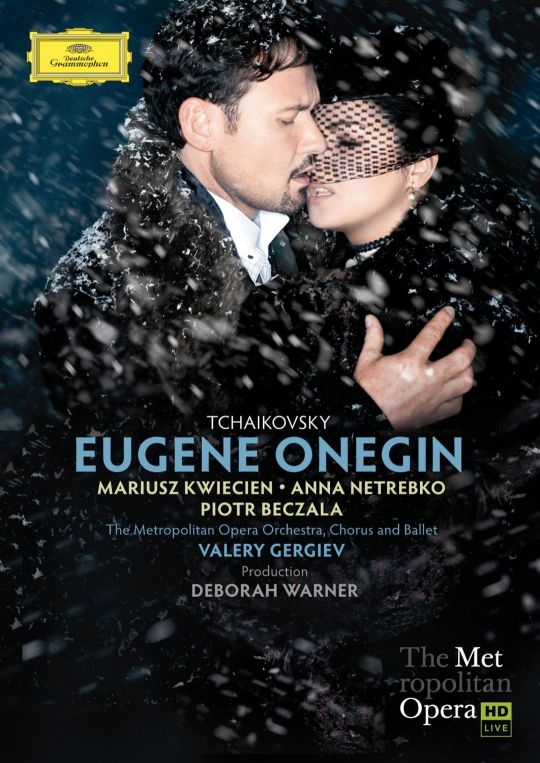

0 notes
Photo

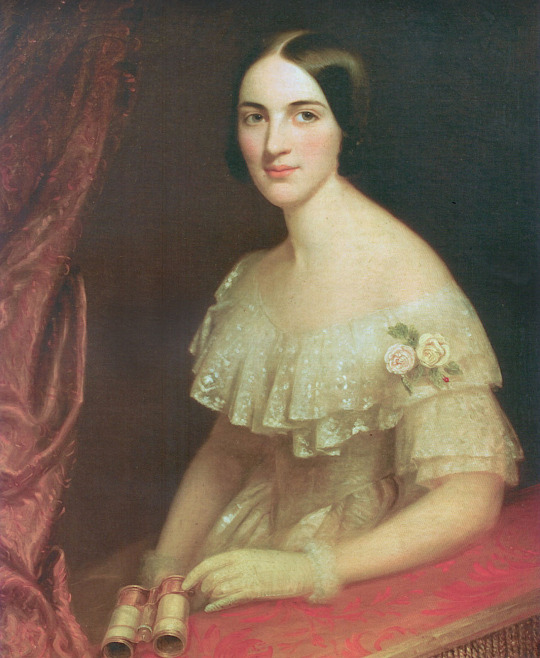
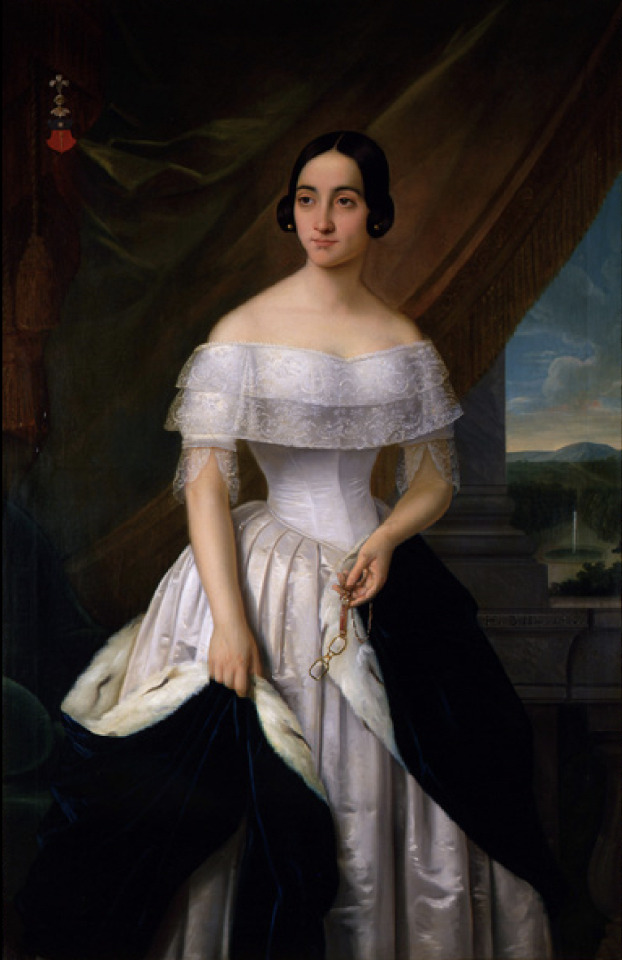
Ekaterina Goncharova, Baroness Gekkern:
1838 Ekaterina Goncharova, Baroness Gekkern by Jean-Baptiste Sabatier (Alexander Pushkin Memorial Museum - St. Petersburg, St. Petersburg Federal City, Russia). From Wikimedia; removed spots and vertical cracks with Photoshop 1833X2048 @300 2.6Mp. This is an outstanding example of a pelerine.
1840 Ekaterina Goncharova by ? (State A. S. Pushkin Museum - Prechistenka Ulitsa, Moskva, Russia). From Wikimeida; darkened light patch in c. bkgnd with Photoshop & decreased temp' 85% and satn 10% and increased sharpness 100% 1307X1608 @200 429kj.
1840 Catherine Gontcharoff, baronne d'Anthès Heeckeren by Henri Beltz (location ?). From Wikimedia; expanded to fit screen 1848X2854 @144 794kp,
I hope this is the back story - Ekaterina Goncharova's story is interesting. According to her French Wikipedia article (Google translation), "She spent her childhood and teenage years in Moscow, where he received a good education.In the fall of 1834 at the invitation of his younger sister, Natalia, wife of Alexander Pushkin, Ekaterina moved to St. Petersburg with her in the house of Pushkin. In December of the same year she became a maid of honor to the Empress. (The Empress is Alexandra Feodorovna - gogm) Ekaterina met Georges-Charles d'Anthes in the fall of 1834, shortly after moving to St. Petersburg. Their wedding took place January 10, 1837, in two ceremonies: one Catholic and one Orthodox. The couple had four children.She died Oct. 15, 1843, due to puerperal fever after giving birth to her son."
According to his Wikipedia article, George Charles d'Anthes was an Alsatian aristocrat and military officer who supported the Bourbons and not the Orléanists in 1830 so he went back to Alsace and then was allowed to serve abroad. He ended up in St. Petersburg. There he joined the Knights Guards and also met and married Ekaterina.He also met the Dutch plenipotentiary to the court, Baron Heeckeren. Baron van Heeckeren was childless and did not want his title to become extinct. "After a lengthy correspondence and a journey to Alsace, the latter (Baron Heeckeren - gogm) proposed to d'Anthès's father to adopt the son as his heir. After the agreement of the King of the Netherlands, Georges-Charles d'Anthès took the name of Georges-Charles de Heeckeren d'Anthès."
"D'Anthès met Pushkin and his wife, Natalia ("Natasha"), a beautiful and flirtatious young woman who had many admirers. D'Anthès courted her in such a way that Pushkin threatened him. D'Anthès then married Natalia's own sister, Yekaterina Goncharova, on 10 January 1837. It has been suggested that d'Anthès's engagement and marriage to Natalia's sister was devised to contradict society gossip that he was in pursuit of Natalia. In any event, this was not enough to soothe the conflict between the two new brothers-in-law, especially since an anonymous letter nominated Pushkin Deputy Grand Master and Historiograph of the Order of Cuckolds. Pushkin's jealousy made him write an insulting letter to d'Anthès's adoptive father. Pushkin having refused to withdraw these abuses, a duel became inevitable." Baron d'Anthes fired first, fatally wounding Pushkin.
#1838#1830s#1840#1840s#early Victorian#Jean-Baptiste Sabatier#Henri Beltz#straight hair#side braid coiffure#lace pelerine#pleated bertha#elbow length close sleeves#flared cuffs#long sheer over-sleeves#V waistline#full skirt#lace bertha#lace cuffs#off-shoulder nee waistline#off-shoulder straight neckline#Baroness Gekkern
2 notes
·
View notes
Photo
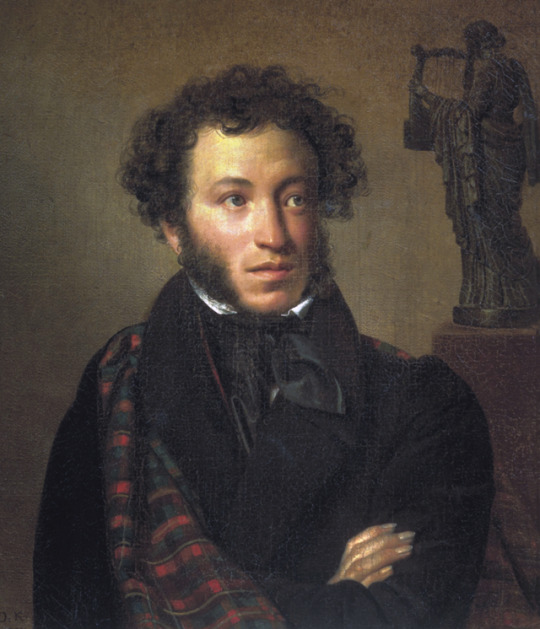
Have you ever wanted to know more about your favorite classic authors? Each month, we share various facts about the lives and works of our Author of the Month.
During June, we honored Alexander Pushkin as our Author of the Month. He was born on June 6th 1799 in Moscow. A Russian poet, playwright, and novelist who is considered by many to be the greatest Russian poet and the founder of modern Russian literature. Some of the most interesting things we learned about him this month were…
Alexander Pushkin, at the age of 8, reputedly wrote little plays in French, which he acted with his sister. It is evident from his letters and other sources that Alexander Pushkin contemplated writing a series of dramatic works but only ever completed one play.
In 1817 Alexander Pushkin entered government service. However, he had gradually become committed to social reform and emerged as a spokesman for literary radicals. That angered the government and led to his transfer from the capital in May 1820.
After he finished school, Alexander Pushkin plunged into the vibrant and raucous intellectual youth culture of the capital, Saint Petersburg. In 1820, he published his first long poem, Ruslan and Ludmila, with much controversy about its subject and style.
In 1823, Alexander Pushkin moved to Odessa, where he again clashed with the government, which sent him into exile until 1826. During this time, he wrote nostalgic love poems which he dedicated to Elizaveta Vorontsova, wife of Malorossia's General-Governor.
In 1831 he married Natalia Goncharova and it was the attentions paid to her by Baron Georges D'Anthès, a French royalist in Russian service, that led to the duel in which Pushkin was fatally wounded
For the month of July, we are exploring the life and work of Franz Kafka. Be sure to follow the #ClassicsInContext hashtag on Twitter to learn more!
Image via Wikimedia Commons
#Classics in Context#Alexander Pushkin#Russian Poet#Russian Literature#Moscow#Eugene Onegin#Boris Gudunov#The Queen of Spades#Odessa#Russian Literary Scene
58 notes
·
View notes
Photo
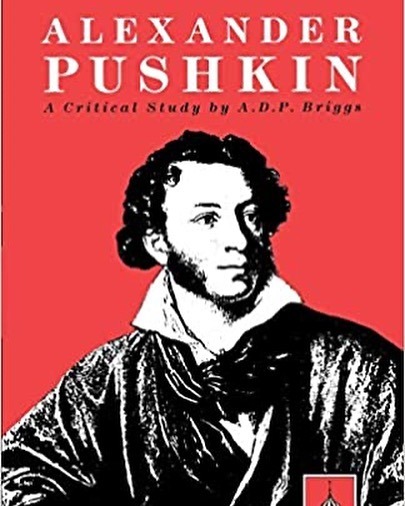
Alexander Sergeyevich Pushkin (May 26, 1799 - January 29, 1837) was a Russian poet, playwright, and novelist of the Romantic era who is considered by many to be the greatest Russian poet and the founder of modern Russian literature. He was born into the Russian nobility in Moscow. His father, Sergey Lvovich Pushkin, belonged to Pushkin noble family. A maternal great-grandfather was African-born general Abram Petrovich Gannibal. He published his first poem at the age of 15 and was widely recognized by the literary establishment by the time of his graduation from the Tsarskoye Selo Lyceum. He recited his controversial poem "Ode to Liberty", one of several that led to his being exiled by Tsar Alexander the First. While under the strict surveillance of the Tsar's political police and unable to publish, he wrote his most famous play, the drama Boris Godunov. His novel in verse, Eugene Onegin, was serialized between 1825 and 1832. He was fatally wounded in a duel with his brother-in-law, Georges-Charles de Heeckeren d'Anthès, known as Dantes-Gekkern, a French officer serving with the Chevalier Guard Regiment, who attempted to seduce the poet's wife, Natalia Pushkina. #africanhistory365 #africanexcellence https://www.instagram.com/p/CeBBB1XOvYbuHTF1BsTPsNKrwdh0Ue3jjQOdo00/?igshid=NGJjMDIxMWI=
0 notes
Photo

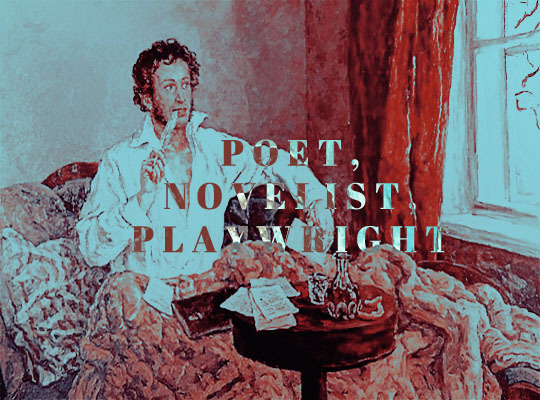
HISTORY MEME → [7/9] Figures: Alexander Pushkin
Alexander Sergeyevich Pushkin (6 June [O.S. 26 May] 1799 – 10 February [O.S. 29 January] 1837) was a Russian poet, playwright, and novelist of the Romantic era who is considered by many to be the greatest Russian poet and the founder of modern Russian literature. Pushkin was born into Russian nobility in Moscow. His matrilineal great-grandfather was Abram Petrovich Gannibal, who was kidnapped from what is now either Eritrea or Cameroon (there are various scholarly views on this) and raised in the household of Peter the Great. He published his first poem at the age of fifteen, and was widely recognized by the literary establishment by the time of his graduation from the Tsarskoye Selo Lyceum. While under the strict surveillance of the Tsar's political police and unable to publish, Pushkin wrote his most famous play, the drama Boris Godunov. His novel in verse, Eugene Onegin, was serialized between 1825 and 1832. Pushkin was fatally wounded in a duel with his brother-in-law, Georges-Charles de Heeckeren d'Anthès, also known as Dantes-Gekkern, a French officer serving with the Chevalier Guard Regiment who attempted to seduce the poet's wife, Natalia Pushkina.
320 notes
·
View notes
Quote
Moral maxims are surprisingly useful on occasions when we can invent little else to justify our actions.
Alexander Sergeyevich Pushkin (1799 to 1837), Russian poet, playwright, and novelist of the Romantic era who is considered by many to be the greatest Russian poet and the founder of modern Russian literature. Pushkin was born into Russian nobility in Moscow. He published his first poem at the age of fifteen, and was widely recognized by the literary establishment by the time of his graduation from the Tsarskoye Selo Lyceum. While under the strict surveillance of the Tsar's political police and unable to publish, Pushkin wrote his most famous play, the drama Boris Godunov. His novel in verse, Eugene Onegin, was serialized between 1825 and 1832.
Pushkin was fatally wounded at age 37 in a duel with his brother-in-law, Georges-Charles de Heeckeren d'Anthès, a French officer serving with the Chevalier Guard Regiment. d'Anthès had attempted to seduce the poet's wife, Natalia Gonchorova Pushkina
222 notes
·
View notes
Text
#Bronze no Tenshi #Natalia Pushkina #Alexander Pushkin #Georges D'Anthès # Natalia my sweet bby girl #Chiho Saito
Natalia did nothing wrong.
I recently reread Bronze no Tenshi and oh my God I love Georges D’Anthès with all my heart - as if I already didn’t love him enough when I first read this manga. He’s so respectful, he’s ready to sacrifice everything for Natalia and he understands a woman’s struggles.
I don’t despise Pushkin in Bronze no Tenshi as it often happens to me with the other “love rival” of Saito’s stories, sometimes I pity him, but I also think a lot of people overlook his flaws and mistakes in his relationship and attitude towards Natalia out of their admiration for the figure of the real Pushkin, the poet. On the other hand, I see a lot of blame put on Natalia, when, if you really think about it, Natalia did nothing wrong. Natalia cannot be the usual strong, single-minded, fierce woman that Saito portrays in her stories: it wouldn’t be realistic and true to the time when the events take place. In my opinion, Natalia was a good person that always sacrificed herself for the people around her, who had for once the chance to do something exclusively for herself when she met the love of her life, D’Anthès.
Keep reading
25 notes
·
View notes
Text
Natalia Nikolayevna Pushkina-Lanskaya
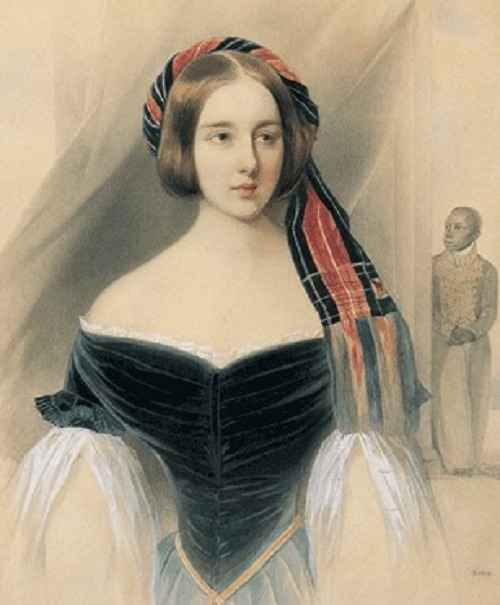
(Russian: Наталья Николаевна Пушкина-Ланская, 8 September 1812 – 26 November 1863) (née Natalia Nikolayevna Goncharova) (Гончарова) was the wife of the Russian poet Alexander Pushkin from 1831 until his death in 1837 in a duel with Georges d'Anthès. Natalia was married to Major-General Petr Petrovich Lanskoy from 1844 until her death in 1863.
Natalia (Natalya) Goncharova was born on 8 September 1812 (27 August 1812 Old Style) in Karian Village in Tambov Governorate (in present-day Znamensky District, Tambov Oblast), where her family lived during the occupation of Moscow by the forces of Napoleon. Her father, Nikolay Afanasievich Goncharov, a scion of the family of paper manufacturers from Kaluga, was pronounced demented in 1815; the household was managed by his wife, Natalia Ivanovna Zagriajskaya, an imperious lady with connections within Muscovite nobility.[1] Her ancestors included Petro Doroshenko, Hetman of Ukrainian Cossacks.
Natalie (as she was familiarly known) met Alexander Pushkin at the age of 16 when she was one of the most talked-about beauties of Moscow
After many hesitations, Natalia eventually accepted a proposal of marriage from Pushkin in April 1830, but not until she had received assurances that the tsarist government did not intend to persecute the libertarian poet. They were officially engaged on 6 May 1830 and sent out wedding invitations. Because of the outbreak of cholera and other circumstances, the wedding was delayed for a year. The ceremony took place on 18 February 1831 (Old Style) in the Great Ascension Church on Bolshaya Nikitskaya Street in Moscow.
During the six years of their marriage, Natalia Pushkina gave birth to four children: Maria (b. 1832, suggested as a prototype of Anna Karenina), Alexander (b. 1833), Grigory (b. 1835), and Natalia (b. 1836) (who married into the Royal House of Nassau-Weilburg to Nikolaus Wilhelm of Nassau and became Countess of Merenberg). As the family lived in the country for prolonged periods, while Pushkin spent most of his time in the capitals, there was a sizeable correspondence between Natalia and Pushkin. Seventy-eight letters from Pushkin to Natalia remain; they are frequently written in a light-hearted tone with touches of ribaldry, but none of them could be called love letters. It is believed that the poet dedicated several poems to her, including "Madonna" (1830). Natalya's correspondence with Pushkin was lost except for one letter, written together with her mother Natalia Ivanovna
In 1835 Natalia met a French immigrant, Georges-Charles de Heeckeren d'Anthès, and was involved in a society intrigue, which provoked rumors of an affair with D'Anthès. These resulted in a duel between Pushkin and D'Anthès on January 27, 1837, in which Pushkin was mortally wounded. Commentators disagree about the propriety of Natalia's behavior in this situation. Some, including Anna Akhmatova and��Marina Tsvetaeva, covertly or overtly blamed Pushkin's death on her, feeling that she did not understand his greatness and failed to take an appropriate interest in his art. It does seem that she preferred worldly pleasures to his company, though to some extent she was obliged to socialise separately from him; for example, even during her pregnancies, she often had to chaperone her sisters in the court, since there was no one else to do so, and only by going into society could they find husbands. Her constant demands for money for costly dresses and jewelry forced the poet to write increasingly for money rather than for pleasure. However, modern research into archival materials and contemporary memoirs, including those of family members (who always mentioned Natalia Nikolayevna with great warmth and respect), leads to a more sympathetic view. It stands to her credit that she preserved Pushkin's letters to her (which suggests that she had some idea of the significance of his written heritage), and subsequently she allowed them to be published.
Much was made of Natalia's relationship with Nicholas I after Pushkin's death; it was even rumored that she became his mistress. In 1843, she met Petr Petrovich Lanskoy (1799-1877), who served in the same regiment as her brother. After having been blessed by the Tsar, their wedding was held in Strelna on 16 July 1844. Lanskoy was in favor with the tsar, and he had had a remarkable career before his marriage. Following the marriage, Natalia gave birth to three daughters: Alexandra (b. 1845), Elizaveta (b. 1846) and Sophia (b. 1848). Natalia died on 26 November 1863 and her ashes were laid in the cemetery of the Alexander Nevsky Lavra.
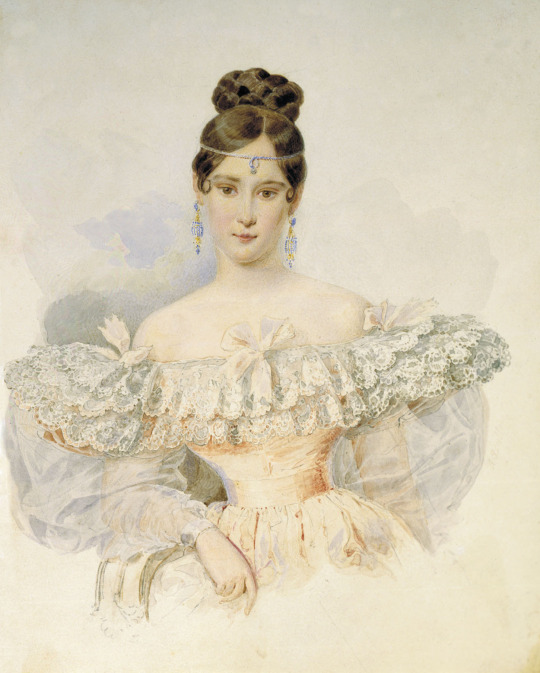
5 notes
·
View notes
Photo
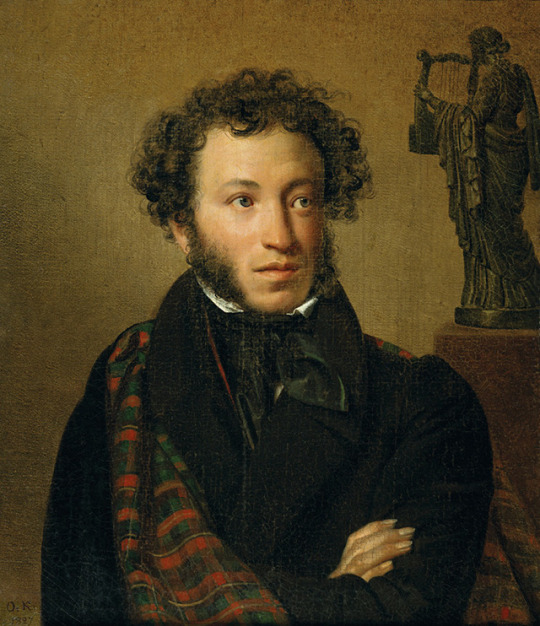
Orest Kiprensky. Portrait of Alexander Pushkin. 1827. State Tretyakov Gallery, Moscow.
Alexander Sergeyevich Pushkin (6 June [O.S. 26 May] 1799 – 10 February [O.S. 29 January] 1837) was a Russian poet, playwright, and novelist of the Romantic era. He was born to Sergei and Nadezhda Pushkin on May 26, 1799. On his father's side he was a descendant of Russian nobility. On his mother's side he was related to an African lord. Pushkin was fatally wounded in a duel with his brother-in-law, Georges-Charles de Heeckeren d'Anthès, also known as Dantes-Gekkern, a French officer serving with the Chevalier Guard Regiment who attempted to seduce the poet's wife, Natalia Pushkina.
Pushkin is considered by many to be the greatest Russian poet and the founder of modern Russian literature. He not only brought Russian poetry to its highest excellence, but also had a great influence on all Russian literature in the nineteenth and twentieth centuries.
A magic moment I remember: I raised my eyes and you were there, A fleeting vision, the quintessence Of all that's beautiful and rare I pray to mute despair and anguish, To vain the pursuits world esteems, Long did I hear your soothing accents, Long did your features haunt my dreams. Time passed. A rebel storm-blast scattered The reveries that once were mine And I forgot your soothing accents, Your features gracefully divine. In dark days of enforced retirement I gazed upon grey skies above With no ideals to inspire me No one to cry for, live for, love. Then came a moment of reinessance, I looked up - you again are there A fleeting vision, the quintessence Of all that's beautiful and rare.
#Orest Kiprensky#Portrait of Alexander Pushkin#XIX century#art#portrait#romanticism#State Tretyakov Gallery#Орест Кипренский#Портрет Александра Пушкина#XIX век#искусство#портрет#романтизм#Государственная Третьяковская галерея#Russia#Moscow#Россия#Москва#poetry#literature#lyrics#lyric quotes
4 notes
·
View notes
Photo
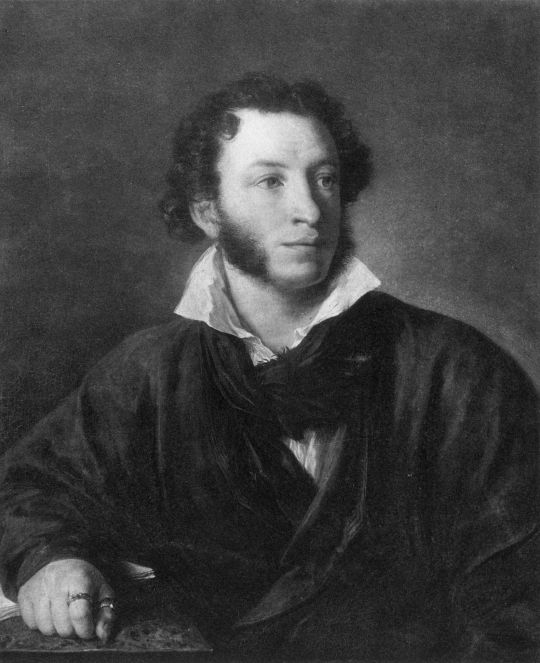
Image: Alexander Pushkin, circa 1830. (Hulton Archive/Getty Images)
Alexander Pushkin was a Russian poet, novelist and playwright. He died on this day (Feb. 10) in 1837 due to injuries sustained during a duel. “A DUEL?!” you ask? “A DUEL,” I answer. YOU GUYS this is the best story so let’s do this:
Pushkin wrote during Czar Nicholas I’s reign, in the 1800s. Early in his career, his poems were considered anarchic by the Russian government. So now our guy is being watched pretty carefully by the government and has to abide by strict censorship rules. He also spent a long vacation (that’s my euphemism for exile) away from St. Petersburg.
Now the plot thickens. Alexander meets the hottest thing in Russia since sliced bread, which, for the record, was not a thing until about 100 years later in 1928. Natalya Goncharova was a beauty by all accounts and caught everyone’s attention as soon as she walked in the room. Pushkin proposed to the young Goncharova and she said yes (after checking with the czar that the poet was not, in fact, going to be exiled again).
So, like I said, Goncharova was very popular in the Russian court. A French refugee named Georges D'Anthès was especially interested in Goncharova and flirted with her, a married woman, constantly in public. The court was afire with rumors and an anonymous letter was published accusing Pushkin of not being able to hold onto his woman. Naturally, the poet was upset -- his honor and manhood (heaven forbid) had been challenged. So he challenged D’Anthes to a duel to restore his image (well, technically he challenged D’Anthes’ adopted father, but Pushkin knew the dad was too old to duel, talk about shady). The poet managed to wound his opponent, but D’Anthes did one better: He shot Pushkin in the stomach.
The poet died two days later. As for D’Anthes? He died an old man, claiming to his closest friends that he regretted never getting to be with his one true love, Natalya Goncharova.
-Intern Kelli
111 notes
·
View notes
Photo
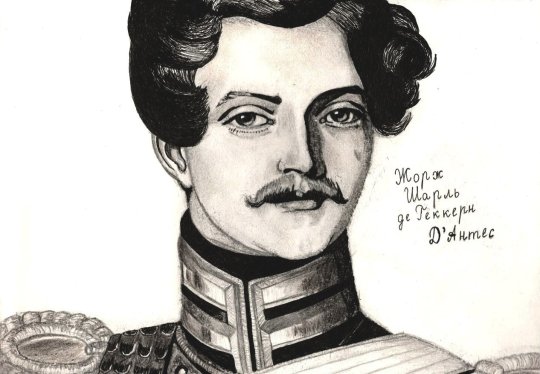
You know, Russians don’t really love Georges d'Anthès for killing our famous poet Alexander Sergeevich Pushkin. But that officer was a handsome one bastard as far as I can see)
38 notes
·
View notes
Text
Alexander Pushkin
Alexander Sergeevich Pushkin was a Russian creator who is viewed as the best Russian writer and the author of current Russian writing. Pushkin spearheaded the utilization of vernacular discourse in his sonnets and plays, making a way of narrating—blending dramatization, sentiment, and parody—related with Russian writing from that point forward and extraordinarily affecting later Russian scholars.
Brought into the world in Moscow, Pushkin distributed his first sonnet at fifteen years old, and was broadly perceived by the scholarly foundation when of his graduation from the Imperial Lyceum in Tsarskoe Selo. Pushkin step by step got focused on friendly change and arisen as a representative for artistic extremists; in the mid 1820s he conflicted with the public authority, which sent him into oust in southern Russia. While under the exacting reconnaissance of government controls and incapable to travel or distribute voluntarily, he composed his most popular play, the show Boris Godunov, yet couldn't distribute it until some other time. His tale in refrain, Eugene Onegin, was distributed sequentially from 1825 to 1832.
Pushkin and his better half Natalya Goncharova, whom he wedded in 1831, later became regulars of court society. In 1837, while falling into more noteworthy and more prominent obligation in the midst of bits of gossip that his better half had begun directing a shameful illicit relationship, Pushkin tested her supposed sweetheart, Georges d'Anthès, to a duel. Pushkin was mortally injured and passed on two days after the fact. On account of his liberal political perspectives and effect on ages of Russian dissidents, Pushkin was depicted by Bolsheviks as a rival to common writing and culture and an archetype of Soviet writing and verse. Tsarskoe Selo was renamed after him.
Read More About Alexander Sergeevich Pushkin
0 notes
Text
Character research
Alexander Sergeevich Pushkin was a Russian Romantic author who is considered to be the greatest Russian poet and the founder of modern Russian literature Pushkin pioneered the use of vernacular speech in his poems and plays, creating a style of storytelling—mixing drama, romance, and satire—associated with Russian literature ever since and greatly influencing later Russian writers. Born in Moscow, Pushkin published his first poem at the age of fifteen, and was widely recognized by the literary establishment by the time of his graduation from the Imperial Lyceum in Tsarskoe Selo. Pushkin gradually became committed to social reform and emerged as a spokesman for literary radicals; in the early 1820s he clashed with the government, which sent him into exile in southern Russia. While under the strict surveillance of government censors and unable to travel or publish at will, he wrote his most famous play, the drama Boris Godunov, but could not publish it until years later. His novel in verse, Eugene Onegin, was published serially from 1825 to 1832. Pushkin and his wife Natalya Goncharova, whom he married in 1831, later became regulars of court society. In 1837, while falling into greater and greater debt amidst rumors that his wife had started conducting a scandalous affair, Pushkin challenged her alleged lover, Georges d'Anthès, to a duel. Pushkin was mortally wounded and died two days later. Because of his liberal political views and influence on generations of Russian rebels, Pushkin was portrayed by Bolsheviks as an opponent to bourgeois literature and culture and a predecessor of Soviet literature and poetry. Tsarskoe Selo was renamed after him.
Resource www.goodreads.com
0 notes
Photo
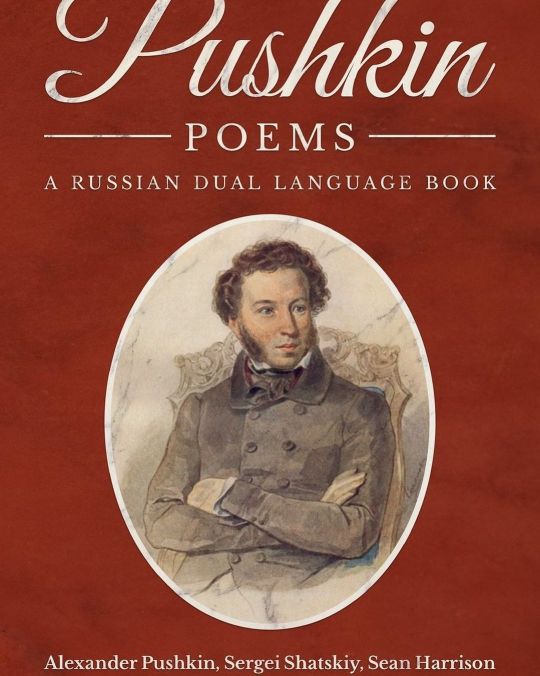
Alexander Sergeyevich Pushkin (May 26, 1799 - January 29, 1837) was a Russian poet, playwright, and novelist of the Romantic era who is considered by many to be the greatest Russian poet and the founder of modern Russian literature. He was born into the Russian nobility in Moscow. His father, Sergey Lvovich Pushkin, belonged to Pushkin noble families. A maternal great-grandfather was African-born general Abram Petrovich Gannibal. He published his first poem at the age of 15 and was widely recognized by the literary establishment by the time of his graduation from the Tsarskoye Selo Lyceum. He recited his controversial poem "Ode to Liberty", one of several that led to his being exiled by Tsar Alexander the First. While under the strict surveillance of the Tsar's political police and unable to publish, he wrote his most famous play, the drama Boris Godunov. His novel in verse, Eugene Onegin, was serialized between 1825 and 1832. He was fatally wounded in a duel with his brother-in-law, Georges-Charles de Heeckeren d'Anthès, also known as Dantes-Gekkern, a French officer serving with the Chevalier Guard Regiment, who attempted to seduce the poet's wife, Natalia Pushkina. #africanhistory365 #africanexcellence https://www.instagram.com/p/CPVZ9wWrnYiupnmAU1JvSUUlljS7A9iUKg19YQ0/?utm_medium=tumblr
0 notes